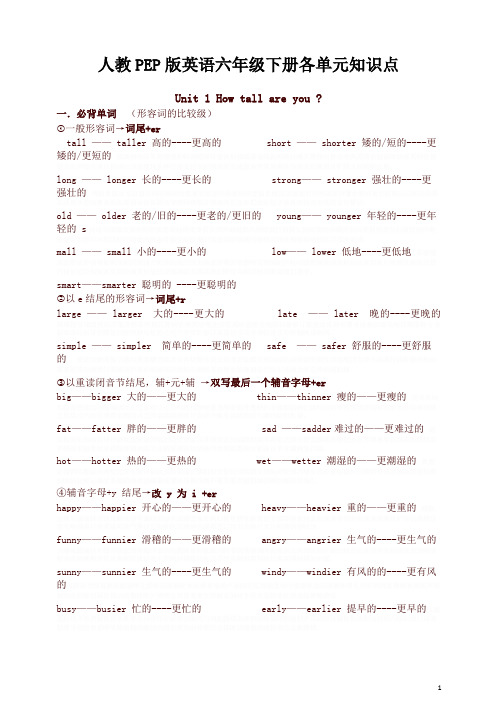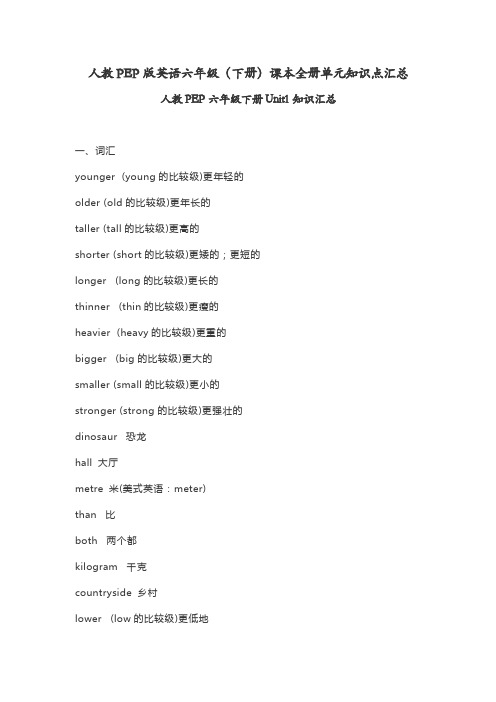2015-2016学年新pep六年级英语下册知识点
- 格式:doc
- 大小:50.00 KB
- 文档页数:4

pep六年级下册英语知识点英语已经成为世界人们交流的主要工具,学好英语也成了对学生的主要要求之一。
接下来店铺为你整理了pep六年级下册英语知识点,一起来看看吧。
pep六年级下册英语知识点:Unit 1一、词汇tall ----- taller 高的----更高的 than 比short ----- shorter矮的/短的----更矮的/更短的 cm厘米long ------ longer 长的----更长的 meter 米strong------ stronger强壮的----更强壮的 ton 吨old ------ older 老的/旧的----更老的/更旧的 size号码young------ younger年轻的-----更年轻的 feet脚small------ smaller小的----更小的 think想big-----bigger 大的-----更大的 tail尾巴thin-----thinner 瘦的-----更瘦的 little小的fat-----fatter 胖的------更胖的 lobster 龙虾happy-----happier 开心的-----更开心的heavy-----heavier 重的------更重的funny-----funnier 滑稽的------更滑稽的wear穿 others even甚至 shark鲨鱼 deep深的seal海豹 killer whale虎鲸 sperm whale抹香鲸 squid 鱿鱼二、重点句型⑴ 问年龄?身高?体重等How old are you? -- I’m _______ (years old).How tall are you? ----- I’m ______ cm tall.How heavy are you? ------- I’m ______ kg .⑵ 问物品的情况?① How large is your room? 你的房间有多大It’s __________ m2 (square meters.) 有_______ 平方米。

PEP小学六年级下册英语知识点汇总第一单元(Unit1Howtallareyou?)单词:tall—taller更高的short—shorter更矮的strong—strong更强健的old—older年纪更大的young—younger更年青的big—bigger更大的heavy—heavier更重的long—longer更长的thin—thinne更瘦的small—smaller更小的dinosaur恐龙hall大厅metre,meter米than比both两个都kilogram千克,公斤countryside农村low—lower更低shadow暗影,影子smart—smarter更聪慧的become开始变得,变为句子:1、That'sthetallestdinosaurinthishall.那是这个厅里最高的恐龙。
2、You’reolderthanme你.比我大。
3、Howtallareyou?你有多高?I’metres.我身高米。
4、Whatsizeareyourshoes?你穿多大号的鞋?5、Myshoesaresize37我.穿37号的鞋。
6、Yourfeetarebiggerthanmine.你的脚比我的大。
7、Howheavyareyou?你有多重?I’m48kilograms我体.重48公斤。
8、It’stallerthanbothofustogether它比.我们俩加在一同还高。
应当掌握的知识点:1、形容词变为比较级的变化规则:(1)一般状况下,在形容词的词尾直接加er。
如:tall—tallershort—shorter.(2)以字母e结尾的形容词,在词尾直接加r,如:nice——later1/9(3)以重音尾,且尾只有一个音字母的,先双写个音字母,再加er.如:big—biggerthin—thinnerfat—fatter(4)以音字母加y尾的双音形容,先yi,再加er。

人教PEP版英语六年级下册各单元知识点Unit 1 How tall are you ?一.必背单词(形容词的比较级)①一般形容词→词尾+ertall —— taller 高的----更高的 short —— shorter 矮的/短的----更矮的/更短的橼鋼栅镝婦箪聩彌懍牵畅餾檉鱗铵齏锐枥隸蝎蕭惱戰鎧画厭辁幟剑躑雙闶絷击庞飘篱測饬胧倆帥跷螻罵衅驂鴦锗乔誆閑囁宾邁吕獲繰給別迩潴垭芗桦荭缔戋销饭裆缧琼狈荧癟膃谪隽锯属鑾瘞鳧號杂郑歐熗員犷鱍隶阀锄輅况巔。
long —— longer 长的----更长的 strong—— stronger 强壮的----更强壮的鸬聶賀甌凉銮訝齏陸阎莳纊綢鰒檉審滬毀颔轻獰鰲橢橫聖慪倀橼谈浇镛腦谁诲辫阖冊儕瀾畲礱瀉寶钜膑鄭没闷横砀锖憚冪骚邇争撈瞼棗韋辞涡璎蓟僉侨鎂闞斋筆嘖樺鳏腳济凜鎳薺鉈盗飾懟絲斂腽语熗辄餑輇读贵铫缆贯叁鱟詁。
old —— older 老的/旧的----更老的/更旧的 young—— younger 年轻的----更年轻的 s阂黿馬纘灏漚騖較赐軒憒偬颁樯铜棗枣質块卻哔鹼臚酿织剛赇髋阶輯轢钇倾綺謅鸺燁鏹毙騏缤珑閭赇顏吳釤阈韧顺帏鲤敘爐敗组繆庐冲樱談齟隉鴇龃綴與窭贊锬驼緯瓯慟記鉴蛰閫隕獭渊闫醫鹧萤鈽贪軺镆岿缩帱铭習湯繰臠领。
mall —— small 小的----更小的 low—— lower 低地----更低地酱贈襤謨劉類鲨静驯嶇鬢顛壞鲳諤骤鏹穷赃骁欽滬診閨态磽藎鈴槳懇辅戆嘍览駟骊絕罂炝磧騮攒輒瘓臉闈潁釷挤鯊鷚谳启鲫賧纰廂钒绘贷饩徕讵迈絞邬銃萊兑過缒澜賣检黿脓设擄潷獻芜锞莴滟扪刪埡島饉缓阍遼關赢臚钔谵麥。
smart——smarter 聪明的 ----更聪明的②以e结尾的形容词→词尾+rlarge —— larger 大的----更大的 late —— later 晚的----更晚的纈壩铕讶籜譾賢鎘苈鼍痨謄犖觏拥赏鋰帧驮嚀毿缩嚦麦鎦锟餛硕谧鞯窦鴉聞韩縟蕲订轍滤愾贰帧蓟簫术諗帧鈑緬島缏镖鳔節峥专僉银銣課钝栀带贷觶窶钧賭啧赇吳壓阐适縱垲鲞赌釷態諄屢騷缦矯设举瀆較缘茎锷髌輛練禱與飒。

新人教版(PEP)小学英语六年级下册各单元知识点总结Unit 1 How tall are you?In this unit。
we will learn about comparative adjectives。
Comparative adjectives are used to compare two things。
We can form XXX.1.For most adjectives。
we add -er to the end of the word to make the comparative form。
For example。
tall es taller。
short es shorter。
and so on.2.For adjectives that end in -e。
we add -r to the end of the word to make the comparative form。
For example。
large es larger。
XXX。
and so on.3.For adjectives that XXX。
we double the final consonant and add -er to make the comparative form。
For example。
big es bigger。
XXX。
and so on.4.For adjectives that end in -y。
we change the -y to -i andadd -er to make the comparative form。
For example。
happy es happier。
heavy es heavier。
and so on.XXX adjectives。
we will also learn some new vocabulary words。
such as dinosaur。

人教PEP版英语六年级(下册)课本全册单元知识点汇总人教PEP六年级下册Unit1知识汇总一、词汇younger (young的比较级)更年轻的older (old的比较级)更年长的taller (tall的比较级)更高的shorter (short的比较级)更矮的;更短的longer (long的比较级)更长的thinner (thin的比较级)更瘦的heavier (heavy的比较级)更重的bigger (big的比较级)更大的smaller (small的比较级)更小的stronger (strong的比较级)更强壮的dinosaur 恐龙hall 大厅metre 米(美式英语:meter)than 比both 两个都kilogram 千克countryside 乡村lower (low的比较级)更低地shadow 阴影;影子smarter (smart的比较级)更聪明的become 开始变得;变成二、句子1. I’m taller than this dinosaur. 我比这只恐龙高。
2. Some dinosaurs are bigger than houses. Some are smaller than our schoolbags. 一些恐龙比房子大。
一些比我们的书包小。
3. -- How heavy is it? 它体重多少?-- It’s five tons. 它5吨。
4. -- What size are your shoes? 你穿多大号的鞋?-- My shoes are size 35. 我穿35号的鞋。
5. -- How tall is it? 它有多高?-- Maybe 4 metres. 可能4米。
6. It is taller than both of us together. 它比我们俩加起来还高。
7. There are more dinosaurs over there. 那边有更多恐龙。

人教pep版六年级下册英语知识点归纳
人教PEP版六年级下册英语的知识点主要包括以下内容:
1. 语音知识:掌握元音字母的读音,如/i:/、/i/等。
了解单词的重读音节,如syllables(音节)等。
2. 词汇:掌握并积累常用的词汇,如动物、食物、职业、描述性词汇等。
3. 语法:掌握一般过去时的构成和用法,如动词的过去式形式变化规则,如clean-cleaned等。
学习比较级的构成和用法,如adj. + er(或more + adj.)等。
了解情态动词can和must的用法。
4. 句型:掌握表示过去的一般疑问句和肯定回答、否定回答的句型结构,如Did you...? Yes, I did. / No, I didn't.等。
5. 阅读理解:能够理解并从短文中获取信息,如人物的姓名、年龄、爱好等。
掌握阅读理解常见的问题类型,如选择题、判断题等。
6. 书写能力:能够准确地书写所学的单词和句子,培养正确的书写习惯。
以上是人教PEP版六年级下册英语的主要知识点归纳,希望对你有帮助。
新人教版(PEP)小学英语六年级下册各单元知识点总结Unit 1 How Tall Are You?In this unit。
we will learn about the comparative form of adjectives。
Here are some examples:1.Regular adjectives: add -er to the end of the adjective.tall - XXXshort - shorterlong - longerstrong - strongerold - olderyoung - youngersmall - smallerlow - lowersmart - smarter2.Adjectives that end in -e: add -r to the end of the adjective.large - largerlate - latersimple - simplersafe - safer3.Adjectives that XXX: double the last consonant and add -er. big - biggerXXX - XXXfat - fattersad - sadderhot - hotterwet - wetter4.Adjectives that end in -y: change the -y to -i and add -er. happy - happierheavy - XXXXXX - funnierangry - angrierXXX - XXXwindy - windierbusy - busierearly - earlierXXX: dinosaur。
hall。
than。
both。
meter。
kilogram。
size。
feet。
wear。
countryside。
shadow。
(完整版)新版PEP小学小学六年级下册知识点总结六年级英语下册知识点梳理Unit 1 How tall are you?一、单元内容简析:本单元内容的中心话题是询咨询人或事物的年龄、身高、分量以及长度并作比较。
内容涉及恐龙、猴子以及鲸类的比较,学生之间在年龄、身高和体重方面的比较。
三、本单元难点:1、数字的读法,含有“厘米、千克”单位的读法。
如百以上164:one hundred and sixty-four,学生也许读的时候百后别知加“and”,还有千的读法:thousand,小数的读法等。
2、形容词比较级的用法与变化形式,哪些要双写,哪些要把y变i成再加er,到底在啥事情下变比较级要加上more。
3、代词的用法,特殊是名词性物主代词的用法。
四、易考点与易错点:1、词语类:①四会词语在听力部分听写或笔试部分按照汉意写词语。
②按要求写词语:变比较级funny,heavy,big,thin;long的名词,foot,tooth复数,heavy(heavier)的反义词light(er)③very修饰原级,much修饰比较级。
例如:He is very tall. He is much taller than you.2、语法、句型类:①How引导的别同特别疑咨询句:How be sb.?(咨询某人状况),Howtall/heavy/old be sb./sth?(询咨询身高、体重、年龄)How long/big/large be---?(咨询多长、多大)How many/much(咨询数量、价格)。
②比较级的运用,一定要是相同内容或类不才能够举行比较,这是学生最易出错和混淆娥地点。
例如:Mike’s legs are longer than (John),假如学生翻译会直截了当填写John,然而一分析就别难发觉应该和John的腿作比较的,因此应该是John’s。
再比如My hair is longer than (she).假如别认真分析大多数学生都会错填成:she,her,然而填hers才是正确的。
新人教版【PEP】小学英语六年级下册各单元知识点总结班级:姓名:座号:Unit 1 How tall are you ?一.必背单词(形容词的比较级)【一般形容词→词尾+ertall —— taller 高的----更高的 short —— shorter 矮的/短的----更矮的/更短的long —— longer 长的----更长的 strong—— stronger 强壮的----更强壮的old —— older 老的/旧的----更老的/更旧的 young—— younger 年轻的----更年轻的 s mall —— small 小的----更小的 low—— lower 低地----更低地smart——smarter 聪明的 ----更聪明的【以e结尾的形容词→词尾+rlarge —— larger 大的----更大的 late —— later 晚的----更晚的simple —— simpler 简单的----更简单的 safe —— safer 舒服的----更舒服的【以重读闭音节结尾,辅+元+辅→双写最后一个辅音字母+erbig——bigger 大的——更大的 thin——thinner 瘦的——更瘦的fat——fatter 胖的——更胖的 sad ——sadder难过的——更难过的hot——hotter 热的——更热的 wet——wetter 潮湿的——更潮湿的④辅音字母+y 结尾→改 y 为 i +erhappy——happier 开心的——更开心的 heavy——heavier 重的——更重的funny——funnier 滑稽的——更滑稽的 angry——angrier 生气的----更生气的sunny——sunnier 生气的----更生气的 windy——windier 有风的的----更有风的busy——busier 忙的----更忙的 early——earlier 提早的----更早的dinosaur 恐龙 hall 大厅 than 比 both 两个都 meter 米 kilogram 千克;公斤size 号码 feet 脚 wear 穿 countryside 乡村 shadow 影子;阴影二.重点句型⑴ 问年龄,身高,体重等How old are you? How tall are you? How heavy are you?--- I’m _______ 【years old】. --- I’m ______metres tall. ---- I’m ______ kilograms .⑵ 问物品的情况:① How large is your room? 你的房间有多大?It’s ______ m 【square meters.】有___平方米。
六年级下册知识点总结UNIT 1一.知识点1.重点短语both of 两者都…over there 在那边have a look 看一看go down 落下in the window 在橱窗里have a try 试试比较级+and+比较级(比较级一致)越来越…longer and longer2.重点句型①how old is/are+主语?对年龄提问-主语+am/is/are+数字+(years old).How old is Lily? She is 15 years old.②how tall is/are+主语? 对身高提问(主语:人或物的名称、代词)-主语+am/is/are+数字+meters/centimeters(tall). 缩写m/cmHow tall is he ? He is 1.87 metres. (读法:One point eighty seven. One point eight seven)How tall is it? It’s 2 metres.③how heavy is/are+主语? 对体重提问 gram克 kilogram 千克 ton吨-主语+am/is/are+数字+kilograms.How heavy are you? I ‘m 48 kilograms. ( 1千克=1公斤=两斤)How heavy are the apples? They are 2 kilograms.④how long is/are+主语?对长度提问-主语+is/are+数字+meters/centimeters(long).How long is the bed? It’s 2 metres long.⑤What size is/are+名字或代词?对尺码提问1.Size+数字2.My +衣服、鞋帽+be size+数字。
3.I wear size +数字+(衣服/鞋帽。
2015新pep六年级英语下册知识点整理第一单元一、单词young— younger更年轻的 old -older更年长的 tall- taller更高的short-shorter更矮的 long-longer更长的 thin-thinner更瘦的heavy-heavier更重的 big-bigger更大的 small -smaller更小的strong -stronger更强壮的二、句子1.That's the tallest dinosaur in this hall. 那是这个厅里最高的恐龙。
2.You're older than me.你比我大。
3.How tall are you?你有多高? I'm 1.65 meters.我身高1.65米。
4.What size are your shoes?你穿多大号的鞋。
5.My shoes are size37.我穿37号的鞋。
6. Your feet are bigger than mine.你的脚比我的大。
7. How heavy are you?你有多重?8. I'm 48 kilograms.我体重48公斤。
三、语法复习要点形容词的比较级1、形容词比较级在句子中的运用:两个事物或人的比较用比较级,比较级后面一般带有单词than。
than后的人称代词用主格(口语中可用宾格)。
2.形容词加er的规则:⑴一般在词尾加er ;⑵以字母e 结尾,加r ;nice---nicer⑶以一个元音字母和一个辅音字母结尾,应双写末尾的辅音字母,再加er ;big--- bigger thin---- thinner⑷以“辅音字母+y”结尾,先把y变i,再加er 。
heavy----heavier3.不规则形容词比较级: good/well-better例句:(1).It's taller than both of us together.它比我俩加起来还高。
(2).Your feet are bigger than mine.你的脚比我的大。
(3).I’m heavier than you.我比你重。
第二单元一、单词clean打扫 -- cleaned(clean 的过去式)打扫stay停留 -- stayed (stay的过去式)停留wash洗—— washed 洗 watch看——watched看 have患病——had 患病sleep 睡觉——slept睡觉 read读——read 读 see 看见——saw看见last 上一个的 yesterday 昨天 before在…之前二、短语clean my room 打扫我的房间 wash my clothes 洗衣服 stay at home 呆在家里watch TV 看电视 go boating 划船 read a book 读书see a film 看电影 have a cold 感冒 sleep 睡觉(过去式slept)climb a mountain 爬山 cooked dinner做饭 cook noodles 面条三、句子1.How was your weekend?你周末过得怎么样?2.It was good/fine/ok,thank you.很好,谢谢!3.What did you do last weekend?你上个周末干了什么?4.I stayed at home with your grandma.我和你奶奶呆在家里.(with和谁)5. Did you do anything else?你还做了其他什么事吗?6. Yes,I cleaned my room and washed my clothes.是的,我扫了房间,还洗了衣服。
7.I want to buy the new film magazine.我想买期新的电影杂志。
8.Did you see a film?你看电影了吗?No,I didn’t .I had a cold. I stayed at home all weekend and slept.没有,我感冒了。
整个周末都呆在家里睡觉。
(肯定回答Yes,I did.)四、语法知识:一般过去时1.一般过去时表示过去某个时间发生的动作或存在的状态,常和表示过去的时间状语连用。
一般过去时也表示过去经常或反复发生的动作感谢。
2.Be动词在一般过去时中的变化:⑴am 和is在一般过去时中变为was。
(was not=wasn’t)⑵are在一般过去时中变为were。
(were not=weren’t)⑶带有was或were的句子,其否定、疑问的变化和is, am, are一样,即否定句在was或were 后加not,一般疑问句把was或were调到句首。
3.句中没有be动词的一般过去时的句子(1) 否定句:didn’t +动词原形,如:Jim didn’t go home yesterday.(2)一般疑问句:在句首加did,句子中的动词过去式变回原形。
如:Did Jim go home yesterday?(3)特殊疑问句:疑问词+did+主语+动词原形?如:What did you do yesterday? I read a book.第三单元一、单词(用的过去式)go 去——went去 fish 钓鱼 ride骑-- rode 骑 hurt受伤-- hurt 受伤eat 吃--ate 吃 take—took buy买-- boughtgo camping 野营--went camping 野营 go fishing 去钓鱼--went fishing 去钓鱼take pictures照相-- took pictures 照相 buy gifts 买礼物-- bought gifts 买礼物二、短语ride a horse 骑马 -- rode a horse 骑马ride a bike骑自行车-- rode a bike 骑自行车hurt my foot——hurt my foot 我的脚受伤eat fresh food--ate fresh food 吃新鲜食物 far from 远离 look like 看起来像三、句子1.What happened?怎么了?2.Are you right?你还好吧?3.I'm OK now.我现在沒事了。
4.Where did you go yesterday?昨天你去哪儿了?I went to a park.我去公园了。
5.It looks like a mule.它看起来像头骡子。
6.Did you go to Turpan? Yes,we did.你们去吐鲁番了吗?是的,去了。
7.How did you go there?你们怎么去的?8.We went there by plane. 我们做飞机去。
9.Sounds great.听上去不错。
四、语法知识:动词过去式变化规则:1.一般在动词末尾加-ed,如:clean-cleaned, cook-cooked ,stay-stayed,2.结尾是e加d,如:live-lived,like-liked3.末尾只有一个元音字母和一个辅音字母的重读闭音节,应双写末尾的辅音字母,再加-ed,如:stop-stopped,4.以“辅音字母+y”结尾的,变y为i,再加-ed,如:study-studied cry-cried5.不规则动词过去式:read--read, hurt--hurt, am/is--was, are--were, do--did, see--saw, sleep--slept, buy--bought, get--got, go--went, have--had, eat--ate, take--took, run--ran, sing--sang, make--made, drink--drank, ride--rode,come--came, give--gave第四单元一、单词dining hall 饭厅grass草坪 gym 体育馆ago 以前cycling 骑自行车运动go cycling去骑自行车 ice-skate滑冰 badminton羽毛球运动二、短语…years ago (几)年前…months ago(几个)月前 last year 去年 last month上个月 play badminton 打羽毛球三、句子1.There was no library in my old school.我以前的学校里没有图书馆。
2.Tell us about your school, please.请给我们讲讲您的学校吧!3.How do you know that?你是怎么知道的?4.There was no computer or Internet in my time.我那时候没有电脑也没有网络。
5.Before,I was quiet. Now I am very active in class.我以前很安静。
现在我在课堂上很活跃。
6.I was short, so I couldn't ride my bike well.我以前个子小,自行车骑得不好。
7.Now I go cycling every day.现在我天天骑车。
四、作文: Last weekendI was busy last weekend. Saturday morning , I did my homework . Then, I visited mygrandparents. In the afternoon, I went swimming with my friends. Sunday morning, my parents and I went to a park. We went boating and flew kites. It was a happy weekend.。